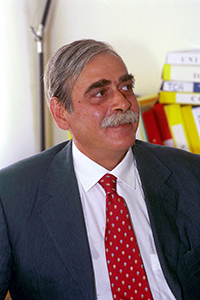The University of Trento mourns the sudden loss of Professor Luigi "Gino" Colazzo.
 Rector Collini shared these memories of him: "I learned with great sadness of the sudden passing of Gino Colazzo. We were colleagues for years at the Department of Economics, including when I was dean. It was him, with a small group of colleagues, who brought the first courses of computer science to our university. He took his work seriously, like a mission, and was always looking beyond the horizon of what he was doing. He was a pioneer of online teaching, to the benefit of thousands of students of the University, and understood ahead of others that e-learners and users are a community. He liked to explore new things, beyond the technicalities of computer science, searching for the best opportunities made available by technologies. He was a good man, humble and wise".
Rector Collini shared these memories of him: "I learned with great sadness of the sudden passing of Gino Colazzo. We were colleagues for years at the Department of Economics, including when I was dean. It was him, with a small group of colleagues, who brought the first courses of computer science to our university. He took his work seriously, like a mission, and was always looking beyond the horizon of what he was doing. He was a pioneer of online teaching, to the benefit of thousands of students of the University, and understood ahead of others that e-learners and users are a community. He liked to explore new things, beyond the technicalities of computer science, searching for the best opportunities made available by technologies. He was a good man, humble and wise".
Professor Colazzo arrived in Trento in 1977, soon after graduating in Computer Science in Bari. He was first employed by the Faculty of Sociology, then became a researcher and finally a professor at the Faculty of Economics. In 2012 he moved to the Department of Industrial Engineering, which had just been created, where he continued to work until his retirement, in February 2018.
The professors, staff and students of the Departments of Industrial Engineering and of Economics and Management are also very sad to hear of the loss of Gino's passing.
We publish a thought from professor Luisa Mich of the Department of Industrial Engineering, who worked with Luigi Colazzo in teaching and research.
"Gino was a cultured man, a philosopher, a computer scientist. He loved to argue. He loved reading. He used to buy books on his way to work. He used to lend them and to forget about that. When people did not return them, he would say that there's always room for new ones on the shelf. He loved Escher and Bateson.
A graduate of professor Alberto Silvestri, he proposed to bring computer science "where problems must be tackled", in the faculties of economics, and therefore out of the departments of engineering and economics. Silvestri welcomed the idea and, having obtained the required approval, began to teach Computer Science in the Economics degree programme in Trento, where Gino was a researcher. In those years, economics students had to pass four computer science exams. Meanwhile, a pilot programme on a new undergraduate degree was ongoing in Rovereto. That led to the degree in Net Economy, which anticipated a number of current issues like the role of knowledge or the need to train managers to computer science. [...]
Research based on parameters and performance indicators was not for him, he pointed out its limits, which are now also emerging from scientific publications.
He dealt with hypertexts and hypermedia before the Web, finding that the "user disorientation" was a key issue. He pioneered e-learning with a vision of teaching based on virtual relations and virtual communities, as they were called back then. But to him, those relations and communities were real. He founded a group to develop the “Comunità online” platform and called it "Laboratorio di Maieutiche", in line with his idea of teaching. He created a journal (Je-LKS. Journal of e-Learning and Knowledge Society) that takes inspiration from the authors that Gino involved, who share his views on the idea of a "community" of scientists.
He was a cactus collector: as an expert, he had dozens of cactuses. He visited Puglia every time he could to look after his plants. He managed to eradicate the red palm weevil. He thought that olive trees had problems because traditional agricultural techniques had been abandoned. He was an excellent cook and knew the local cuisine: he introduced me to friselle and friggitelli and gave me a recipe to bake whole butternut squash and a book on the cuisine of Puglia. He saw himself retired surrounded by his olive trees".


